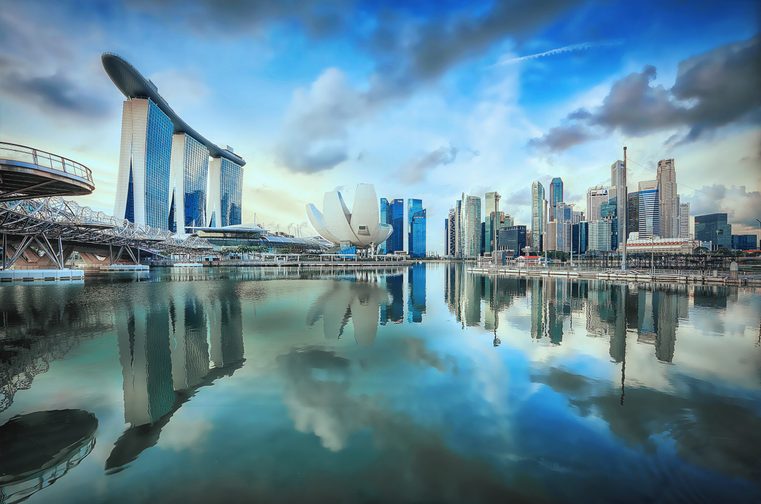Shaping the future of investments in Singapore and the UAE
Through strategic collaboration, both countries are unlocking pathways for growth and enabling businesses to navigate a complex investment landscape.

As global trade dynamics shift amidst rising geopolitical tensions, countries are increasingly diversifying their strategic partnerships. Singapore and the United Arab Emirates (UAE), with shared strengths as trade hubs, financial centres, and gateways to fast-growing regions in Asia, Middle East and Africa, are uniquely positioned to open new avenues for collaboration and shape the future of finance and innovation.
The recent Investopia Global – Singapore event included a panel discussion with senior financial services experts from the UAE and Singapore titled “New Trends Shaping the Investment Landscape in Asia and Middle East”.
Moderated by Steve Brice, Global Chief Investment Officer of Standard Chartered, the discussion explored what makes these two economies attractive as investment destinations and where future opportunities for collaboration lie. The panelists were Simon Treacy, CEO – PE Real Estate at CapitaLand Investment; Abdul Malik Anwar Deen, Managing Director Singapore at CT Group; Raja Al Mazrouei, CEO of Etihad Credit Insurance; and Simon Webster, CEO of Vistra.
Growing digital economies and broadening financial roles
The speakers emphasised the mutual commitment between Singapore and the UAE to advance their digital economies by harnessing emerging technologies that drive industry transformation and growth, enabled by crucial government support.
The two countries’ stable and predictable regulatory environments were recognised as being pivotal in attracting capital, promoting innovation, and supporting the development of new financial products. In equity markets, for instance, Brice highlighted the potential for expanding access to capital through collaboration between the two countries’ stock exchanges. Dual listing in both the UAE and Singapore could be an attractive option for companies with substantial interests in these markets and their respective regions, the audience heard.
Additionally, Singapore and the UAE are both using their status as fintech hubs to serve as springboards for companies seeking to invest in emerging opportunities across ASEAN, the Middle East, and Africa. For instance, the GIA Abu Dhabi Acceleration Programme helps Singaporean tech start-ups expand into the UAE market by connecting them with potential partners in the emirate to test and commercialise their products and services.
The application of artificial intelligence (AI) in sectors such as financial services, edtech, and healthtech was identified as a key area for future collaboration, particularly in terms of developing regulations and ensuring the ethical use of the technology.
Global uncertainty and India’s rise
The speakers also emphasised the political and economic stability offered by the UAE and Singapore, making them attractive destinations for investment especially amid current global uncertainties.
They noted India’s increasing prominence in the region, driven by its own economic growth and strategic positioning, and suggested this development presents mutual opportunities for both Singapore and the UAE. For example, a growing number of high-net-worth individuals and their family offices from India are exploring Singapore and the UAE as key locations to expand their wealth and business interests.
Deepening trade and addressing climate change
The panel also brought attention to how addressing shared challenges could create new investment opportunities. Food security, a pressing concern for both economies, was a major topic of discussion, given both nations’ reliance on food imports.
Currently, the UAE only imports about 7%-8% of its food from ASEAN despite the bloc being a major food producer, which highlights untapped potential for deeper trade ties and increased investment in ASEAN nations such as Vietnam, Thailand, and Indonesia. Singapore, as a hub for ASEAN investments, is well-positioned to facilitate these partnerships. Joint developments in areas like agricultural technology and supply chain logistics can help both the UAE and Singapore mitigate vulnerabilities in their food supply.
Both Singapore and the UAE recognise the urgency of addressing environmental issues that impact economic stability, as demonstrated by several MoUs in the areas of climate change and decarbonisation recently signed between the two countries.
Collaborative investments in sustainable technologies are aimed at helping the two countries shore up crucial natural resources like drinking water and scale the use of renewable energy. With the growing demand for power from technologies like AI, there is a clear opportunity for greater cooperation in areas like nuclear power and hydrogen capture technologies. This shared commitment to sustainability can drive trade and investment between the two regions, creating opportunities for businesses focused on climate solutions.
A future full of possibilities
The interplay of geopolitics, technological advances, and climate change presents both challenges and opportunities for the UAE and Singapore. With forward-thinking companies and collaborative governments, both nations demonstrate their ability to push boundaries and set standards for other regions to emulate.
“Both countries can continue to thrive in this increasingly dynamic and complex trading landscape by building on existing partnerships and leveraging technology to develop innovative solutions that serve the evolving demands of the market, streamline processes, and enhance visibility across the supply chain,” concluded Steve Brice. “In doing so, they can become even more integral to global trade.”
As Singapore and the UAE strengthen their partnership, their joint efforts are set to shape the dynamics of global investments, fostering shared growth, sustainability, and resilience.
Fueling growth and deepening ties
We reinforce our partnership with San Miguel Corporation Group through the facilitation of BankCom’s largest bon…